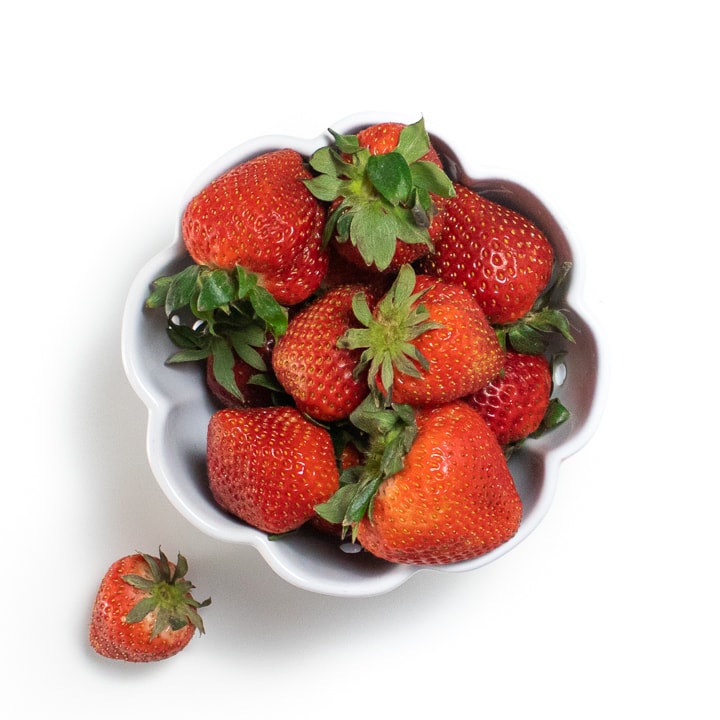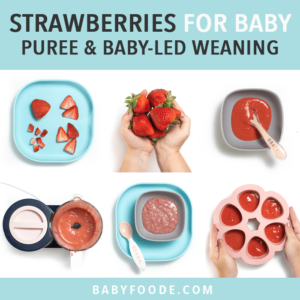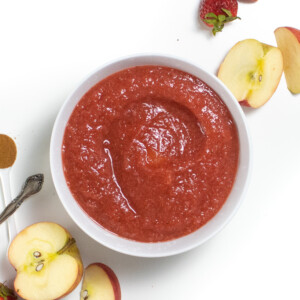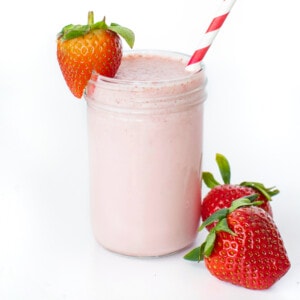Strawberry Profile

Medically reviewed and cowritten by Jamie Johnson, Registered Dietitian Nutritionist (RDN).
Strawberries For Baby
Their vibrant red color says it all. A strawberry’s bright red hue shows you just how nutrient-dense they are! Strawberries help to combat inflammation in the body and ward off pathogens that may make your baby sick. The high levels of Vitamin C found in strawberries will help your baby’s immune system, and the many minerals will help them grow healthy teeth and bones. Strawberries are fantastic in season, but they also freeze well for nutrient-dense snacks year-round. Baby will enjoy them raw as finger foods or as a sweet puree for yogurt or oatmeal!
HEALTH BENEFITS OF STRAWBERRIES
Strawberries are incredibly healthy and considered a superfood for a number of reasons:
- They are high in vitamin C, in fact one cup has 108% of the daily value for vitamin C! This helps support the immune system and helps the body to absorb iron.
- They are a good source of fiber, which help keep the digestive system regular and keeps constipation at bay.
- They’re also a good source of folate, which is important for brain and neuro development.
- Strawberries are high in antioxidants that are important for neutralizing free radicals in our body.
Highlighted Nutritional Importance of Strawberries
Vitamins
Vitamin C – helps to heal small cuts and wounds and helps keep your baby’s gums healthy while teething.
Thiamin – this B vitamin, also known as B1, enables your baby to convert carbohydrates into energy.
Riboflavin – another B vitamin, known as B2, promotes growth and good vision and is essential for baby’s nerve development. Folate– or vitamin B9, is essential for brain and neurodevelopment.
Minerals
Potassium – this is an electrolyte mineral that is crucial for muscle function and your baby’s heart rhythm.
Manganese – a mineral that is essential for metabolism, calcium absorption, and brain function.
Magnesium – vital for immune support and helps to maintain muscle and nerve function.
Are Strawberries a High Allergen Food?
Some parents may have heard that strawberries are a potential allergenic food. Strawberries contain allergens that may be problematic for some people and if you or your family has a history of food allergies, you may want to consider waiting until baby is older to introduce them. Always consult your pediatrician before introducing new foods just to be sure!
How to Select and Store Strawberries
Strawberries are on the Dirty Dozen list, which means you should consider buying them organic, if possible, to avoid synthetic pesticide exposure.
Strawberries are a delicate fruit. They perish easily and should be eaten within two days to preserve the most Vitamin C and polyphenol antioxidants. The strawberries will still be delicious and safe to eat after this two-day window, but the longer they are stored, the more nutrients will be lost. Strawberries love humidity and will stay the freshest in the humid environment of your refrigerator’s cold storage bins. When picking strawberries at the grocery store or farmers market, look for those with a rich, vibrant pinkish-red hue without soft spots or cuts.
Preparing strawberries for baby is easy! If you decide to cook them, steaming or baking is a great, delicious option. You may also choose to serve them raw as a finger food or puree. The puree, either cooked or raw, can be a fun and nutritious addition to full-fat yogurt or oatmeal. Yum!





